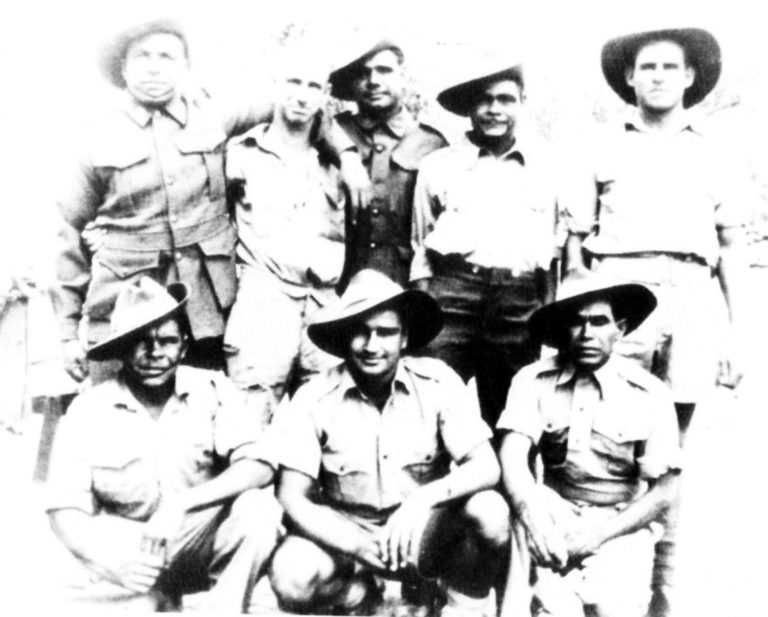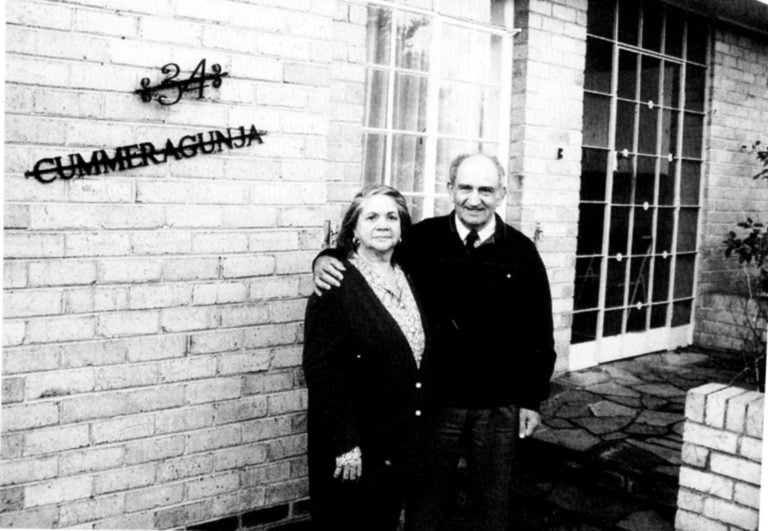In the wake of the Black LivesMatter campaign, it is worth remembering the contribution of a Greek campaigner for Aboriginal rights, Alick Jackomos, who grew up in pre-war Melbourne and was to serve in the Australian Imperial Force (AIF) during the Second World War.
In a chapter dedicated to Jackomos, the author of Greek–Australians in the Australian Forces: World War I and World War II, Steve Kyritsis, shows how Mr Jackomos became fully aware of the inequalities that the Aboriginal communities during his years of army service. Mr Jackomos had developed friendships with Melbourne’s Aboriginal community before the war.
Mr Jackomos was born in Carlton in 1922, his father who ran a fish and chip shop on Johnstone Street. He grew up in a tough neighbourhood and he developed a friendship with an Aboriginal youth two years older his senior, Otway “Otty” Atkinson of the Cummeragunja. Even at a young age, Jackomos attended the Yarra Bank political meetings on Aboriginal affairs and had developed friendships within Fitzroy’s Aboriginal community.
Young Alick tried to enlist as soon as Australia entered the Second World War but was too young and had to wait two years before he was finally accepted in 1942. He had gone to enlist with Otty, who was old enough for service. Mr Jackomos, then an apprentice mechanic, falsifed his papers because he was still a year and three months short of the legal enlistment age of 19 for the AIF.
It helped that he was a trained boxer and wrestler – a role that was to stand him in good stead in later years.
In 1942, the war took on a new more urgent dimension for Australia when the Japanese bombed Darwin in February and then torpedoed a ferry in Sydney Harbour at the end of May.
His battalion, the 2/14th, was sent north to defend against the feared invasion. Jackomos, who was working in the motor and ordinance shops, was stationed at Morphett Creek, about 100km from Tennant Creek where his unit helped the Civil Construction Corps to build a tar road linking Alice Springs to Darwin.
Army life was not exactly to his taste, he was to recall to Mr Kyritsis: “It was very boring … I mean you enlisted to go overseas and here you are in the middle of central Australia in the field workshop”.
“While Alick felt that his military work at Morphed Creek was unsatisfying, he later valued the experience as he developed a greater understanding of the inequities which existed in Australian society between Aboriginal and non-Aboriginal people,” wrote Mr Kyritsis.
Alick was to write: “It was in the Northern Territory that I realised that Aboriginal people suffered enormous handicaps, and were treated inhumanely.”
READ MORE: The Greek Australian-Aboriginal connection
What drove the inequality home was the fact that while he was allowed to recover from a severed finger tip in a hospital ward, Aboriginal patients were expected to recover in beds out on the hospital verandah during the cold winter nights. He was also to notice the big discrepancies in pay.
It was during his stint in the Northern Territories that Jackomos socialized and further developed friendships within the Aboriginal communities that were to last for the rest of his life.
“Otto introduced us to the families in Dunwich which included the Martins, Newfongs, Costellos, Mortons, Closes and Ruskas. These visits were immensely pleasurable and created networks that lasted fifty years,” Jackomos was to recall in Mr Kyritsis book.
Jackomos was eventually to see out the war in the jungles of Indonesia fighting with US, British and Dutch forces to oust the Japanese.
In the immediate years after the peace, he lived an unsettled life and for a while returned to Indonesia to work for an oil company. He even tried the life of the professional wrestler.
He returned to Australia and although he came to consider that “all wars to be a waste of life”, he would march with his battalion every Anzac Day and raise funds for the Returned Services League.
And he took an increasingly prominent position defending Aboriginal rights. In his book, Mr Kyritisis quotes a 1995 article from Neos Kosmos: “Alik Tzakomos holds a unique position in Victorian Aboriginal society. For more than fifty years he has been involved in indigenous matters and has the honour of being the only non-Aboriginal lifelong member of the Aboriginal Elders. Alik’s ties to the indigenous communities were based on mutual love and respect for equality.
“The expatriate married native Merle Morgan and they had three children (1951).
“In more than fifty years of participating in Aboriginal issues, Alik witnessed and participated in significant changes.”
READ MORE: Jackomos named on Victorian Indigenous Honours Roll
In 1968 Mr Jackomos worked with the Victorian Ministry of Aboriginal Affairs and then, from 1974 to 1989, with the Federal Department of Aboriginal Affiars. His son, Andrew, most recently served as Australian Commissioner for Aboriginal Children and Young People. He is now the executive director of Aboriginal Economic Development in Victoria.
Mr Jackomos and his wifewere to be prominent advocates for Aboriginal rights. And their children, Andrew, Esmai and Michael have carried the torch that their parents have lifted so high. The whole family was to work for the Aboriginal Advancement League.
He died in March 1999, at the age of seventy-four, and is still considered a “legend” for Aboriginal people in Australia.
Mr Jackomos recorded his life in the book A Man of All Tribes. The Life of Alick Jackomos. He also worked with Derek Fowell in his book Forgotten Heroes: Aborigines at War from the Somme to Vietnam. His experiences as a wrestler appear in the Sideshow Alley, a book he wrote with Richard Boone.
♦ Steve Kyritsis OAM is the author of three books on the role of Greeks in the Australian armed forces: Greek-Australians in the Vietnam War; Greek-Australians in the Australian Armed Forces World War I and World War II;and Greek-Australians in the Australian Armed Forces Kokoda World War II. The books are in Greek and English and are available from the Hellenic RSL, or from the Melbourne Shrine of Remembrance ($30 each).










